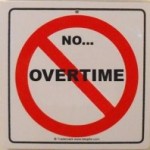By David Worley
 When the Ashtabula County Youth Detention Center declared that it was no longer providing “transitional” positions, which were specifically detailed in the CBA, the employer was found by an arbitrator to have improperly read these provisions out of the CBA.
When the Ashtabula County Youth Detention Center declared that it was no longer providing “transitional” positions, which were specifically detailed in the CBA, the employer was found by an arbitrator to have improperly read these provisions out of the CBA.












